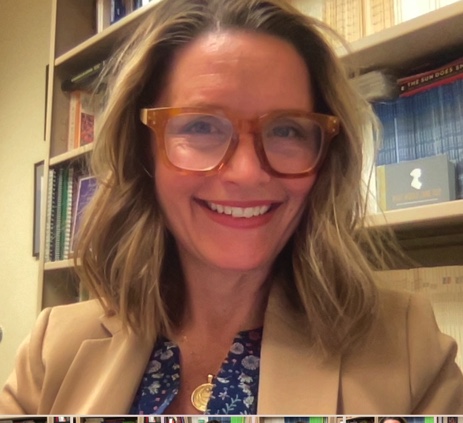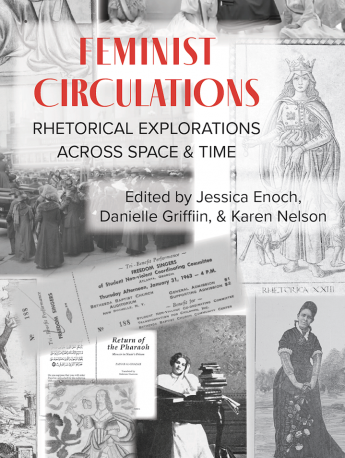Jessica Enoch

Professor, English
Director, Academic Writing Program, English
jenoch1@umd.edu
1116 Tawes Hall
Get Directions
Research Expertise
American
Language, Writing and Rhetoric
Women's Literature and Feminist Theory
Jessica Enoch’s teaching and research focus on feminist rhetorics and pedagogies, feminist memory studies, spatial rhetorics, rhetorical education, histories of rhetoric and composition, as well as literacy studies. Her first book Refiguring Rhetorical Education: Women Teaching African American, Native American, and Chicano/a Students, revisits the seemingly innocuous figure of the nineteenth-century female teacher to investigate the radical iterations of rhetorical education that women teachers have produced (Southern Illinois UP, 2008). Her second monograph Domestic Occupations: Spatial Rhetorics and Women's Work explores the intersections of space, rhetoric, and gender to investigate how the material and discursive constructions of the home have both enabled and constrained women’s entrance into professional occupations and spaces (Southern Illinois UP, 2019) . Her current book project Remembering Suffrage: Feminist Memory and Activism at the Centennial of the 19th Amendment examines commemorations dedicated to the 2020 suffrage centennial using an intersectional feminist analytic. She has published Mestiza Rhetorics: An Anthology of Mexicana Activism in the Spanish-Language Press, 1887-1922 (co-edited with Cristina Ramírez), Women at Work: Rhetorics of Gender and Labor (co-edited with David Gold), Retellings: Opportunities for Feminist Research in Rhetoric and Composition Studies (co-edited with Jordynn Jack), Feminist Circulations: Feminist Explorations across Space and Time (co-edited with Danielle Griffin and Karen Nelson) and Burke in the Archives (co-edited with Dana Anderson). She has also published work on archival research methods and pedagogies as well as and students' revision and reflection practices.
Publications
Thinking about Feeling: The Roles of Emotion in Reflective Writing
By Elizabeth Ellis Miller, Cameron Mozafari, Justin Lohr, Jessica Enoch
Author/Lead: Justin Lohr, Jessica EnochAbstract:
Drawing from a qualitative study, we share findings that demonstrate how students articulate and express emotion in reflection. As they reflect on their writing identities, processes and products, peer and instructor feedback, and assess their work, the students in our study routinely discuss their emotions. Our essay closes with pedagogical strategies for helping students reflect on their thinking and feeling about writing.
Read More about Thinking about Feeling: The Roles of Emotion in Reflective Writing
Circulating Feminist Rhetorics: An Introduction
Contributors include Jane Donawerth, Jessica Enoch, Danielle Griffin, Nabila Hijazi, Shirley Logan, Elizabeth Ellis Miller, Karen Nelson, Michele Osherow, Ruth Osorio, Erin Sadlack, Adele Seeff, and Lisa Zimmerelli.
Author/Lead: Karen Nelson, Jessica Enoch, Danielle GriffinThe scholars in FEMINIST CIRCULATIONS: RHETORICAL EXPLORATIONS ACROSS SPACE AND TIME work at the nexus of gender, power, and movement to explore the rhetorical nature of circulation, especially considering how women from varying backgrounds and their rhetorics have moved and have been constrained across both space and time. Among the central characters studied in this collection are early modern laborers, letter writers, petitioners, and embroiderers; African American elocutionists, freedom singers, and bloggers; Muslim religious leaders; Quaker suffragists; South African filmmakers; nineteenth-century conduct book writers; and twenty-first-century pop stars. To generate their claims, contributors draw from and make use of a breadth of archival and primary documents: music videos, tweets, petitions, letters, embroidery work, speeches, memoirs, diaries, and made-for-television movies. Authors read these “texts” with scrutiny and imagination, adding distinction to their chapters’ arguments about circulation by zeroing in on specific rhetorical concepts that span from rhetorical agency, cultivation of ethos, and development of rhetorical education to capacities for social networking, collective and collaborative authorship, and kairotic interventions.
Domestic Occupations
This feminist rhetorical history explores women’s complex and changing relationship to the home and how that affected their entry into the workplace.
Author/Lead: Jessica EnochAuthor Jessica Enoch examines the spatial rhetorics that defined the home in the mid- to late nineteenth and early twentieth centuries and considers how its construction and reconstruction—from discursive description to physical composition—has greatly shaped women’s efforts at taking on new kinds of work. In doing so, Enoch exposes the ways dominant discourses regarding women’s home life and work life—rhetorics that often assumed a white middle-class status—were complicated when differently raced, cultured, and classed women encountered them.
Enoch explores how three different groups of women workers—teachers, domestic scientists, and World War II factory employees—contended with the physical and ideological space of the home, examining how this everyday yet powerful space thwarted or enabled their financial and familial security as well as their intellectual engagements and work-related opportunities.
Domestic Occupations demonstrates a multimodal and multigenre research method for conducting spatio-rhetorical analysis that serves as a model for new kinds of thinking and new kinds of scholarship. This study adds historical depth and exigency to an important contemporary conversation in the public sphere about how women’s ties to the home inflect their access to work and professional advancement.
Burke in the Archives: Using the Past to Transform the Future of Burkean Studies (Studies in Rhetoric/Communication)
Burke in the Archives brings together thirteen original essays by leading and emerging Kenneth Burke scholars to explore the twenty-first-century usefulness of a figure widely regarded as the twentieth century's most influential rhetorician.
Author/Lead: Jessica EnochBurke in the Archives brings together thirteen original essays by leading and emerging Kenneth Burke scholars to explore provocatively the twenty-first-century usefulness of a figure widely regarded as the twentieth century's most influential rhetorician. Edited by Dana Anderson and Jessica Enoch, the volume breaks new ground as it complicates, extends, and ultimately transforms how the field of rhetorical studies understands Burke, calling much-needed attention to the roles that archival materials can and do play in this process.
Although other scholars have indeed looked to Burke's archives to advance their work, no individual essays, books, or collections purposefully reflect on the archive's role in transforming rhetorical scholars' understandings of Burke. By drawing on an impressively varied range of archival materials--including unpublished letters, newly recovered reviews, notes on articles, drafts of essays, and even comments on student papers from Burke's years of teaching--the essays in this volume mount distinct, powerful arguments about how archival materials have the potential to reshape and invigorate rhetorical scholarship.
Including contributors such as Jack Selzer, Debra Hawhee, and Ann George, this collection pursues Burke behind the arguments of his major works to the divergent preoccupations, habits of mind, breakthroughs, and breakdowns of his insight. Through the archival arguments and analyses that unify its essays, Burke in the Archives showcases how historiographic and methodological work can propel Burke scholarship in new directions.
Refiguring Rhetorical Education: Women Teaching African American, Native American, and Chicano/a Students, 1865-1911
Refiguring Rhetorical Education: Women Teaching African American, Native American, and Chicano/a Students, 1865-1911 examines the work of five female teachers who challenged gendered and cultural expectations.
Author/Lead: Jessica EnochRefiguring Rhetorical Education: Women Teaching African American, Native American, and Chicano/a Students, 1865-1911 examines the work of five female teachers who challenged gendered and cultural expectations to create teaching practices that met the civic and cultural needs of their students. The volume analyzes Lydia Maria Child’s The Freedmen’s Book, a post–Civil War educational textbook for newly freed slaves; Zitkala Ša’s autobiographical essays published in the Atlantic Monthly in 1900 that questioned the work of off-reservation boarding schools for Native American students; and Jovita Idar, Marta Peña, and Leonor Villegas de Magnón’s contributions to the Spanish-language newspaper La Crónica in 1910 and 1911—contributions that offered language and cultural instruction their readers could not receive in Texas public schools.
Enoch explores the possibilities and limitations of rhetorical education by focusing on the challenges that Child, Zitkala Ša, Idar, Peña, and Villegas made to dominant educational practices. Each of these teachers transformed their seemingly apolitical occupation into a site of resistance, revising debilitating educational methods to advance culture-based and politicized teachings that empowered their students to rise above their subjugated positions.
Refiguring Rhetorical Education considers how race, culture, power, and language are both implicit and explicit in discussions of rhetorical education for marginalized students and includes six major tenets to guide present-day pedagogies for civic engagement.


